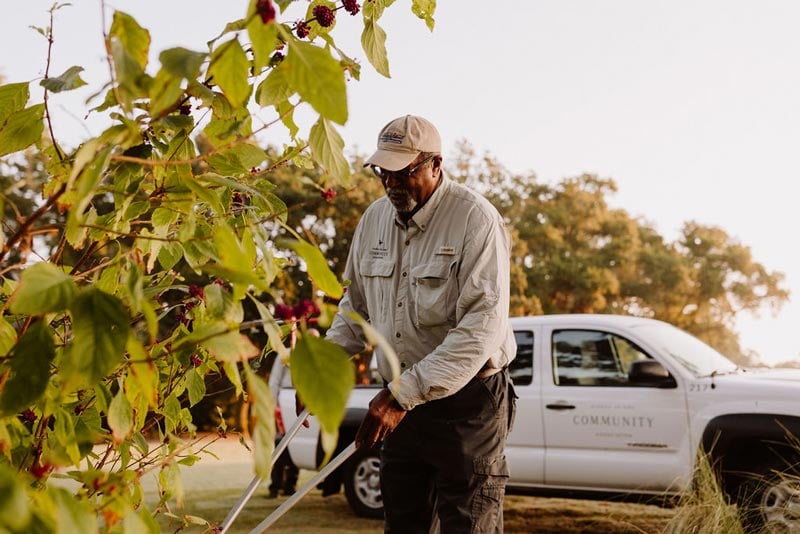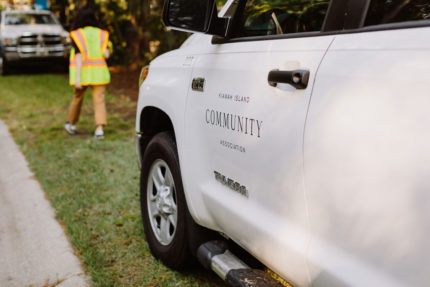Nov
17
2023
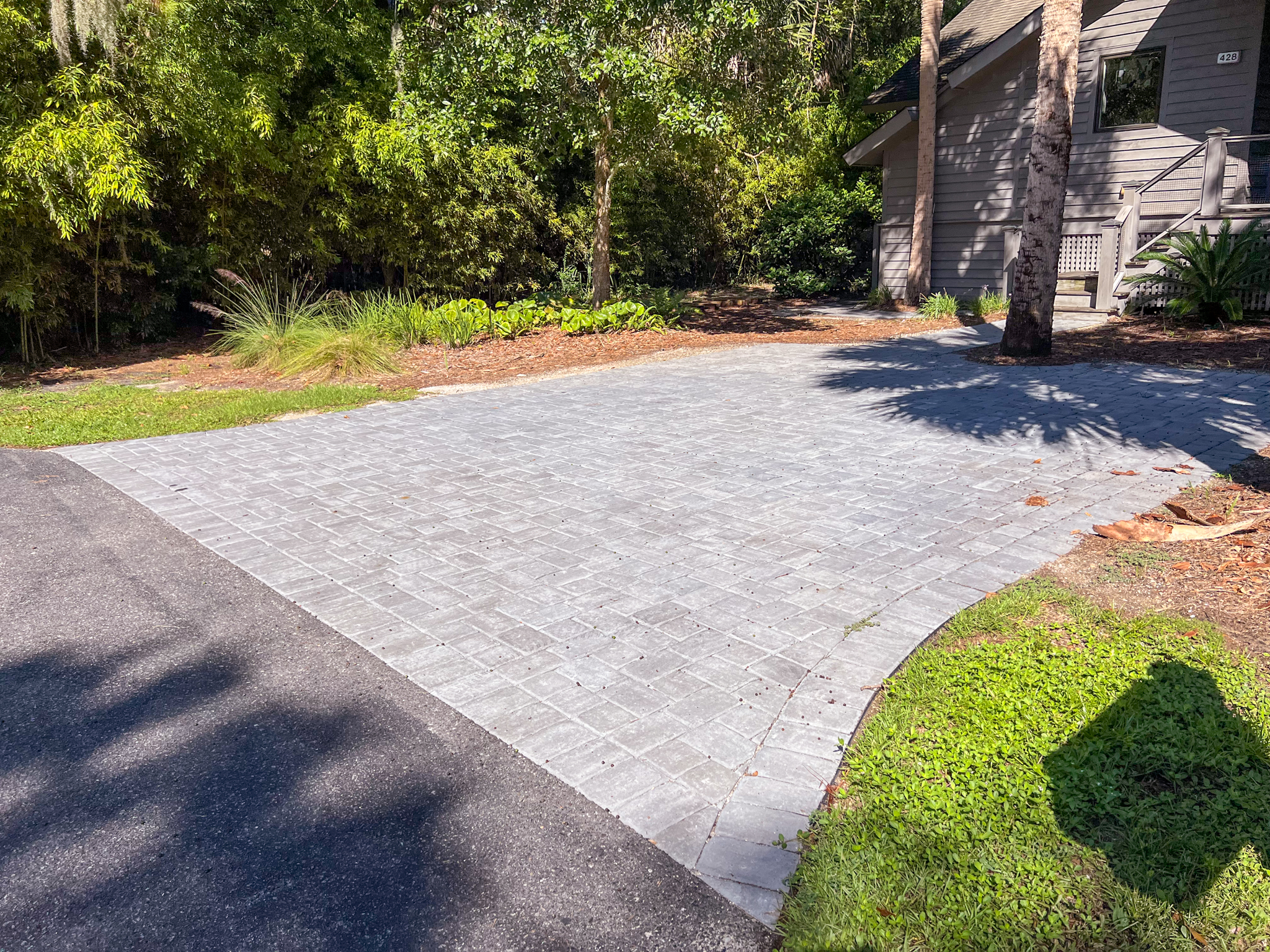
From The Blog
Neighborhood Harnesses Group Negotiating Power to Replace 60 Driveways with Permeable Pavers
In early 2022, Gene Hutchinson, Oceanwoods HOA vice-president, began searching for asphalt vendors to replace his short driveway. When he reached out to asphalt contractors, he discovered they were not interested in such a small asphalt job. As a result, Gene started looking into alternative driveway materials and he settled on pavers. “I loved the look of the pavers at the Sandcastle, so I thought I’d explore those instead.” For the pavers, he worked with Pete Ambrose of Leadenwah Landscapes.
Oceanwoods was originally built in the 1970s. When Gene’s family bought their Oceanwoods home in the early 90s, he heard stories of Jeep safaris launching steps away off the end of Eugenia. “Back then, it was the end of civilization.” The age of the community and its “legacy asphalt,” as Gene puts it, meant that he was confident he could get a least a few of his neighbors interested if a discount was offered. Leadenwah agreed to discount the cost if Gene could get three or four additional owners to get their driveways replaced at the same time. This smaller group would qualify for about a 12.5% discount. Because of the savings, 25 Oceanwoods owners agreed to join Gene’s permeable driveway replacement project. With this larger group, Gene was about to secure a 25% discount from Leadenwah, and the number of interested neighbors exploded. “Most driveways were in need of repair. I provided the information and Leadenwah provided the cost-savings; the project sold itself.”
Before the driveways could be replaced, surveys were required, and approval needed to be granted by the Architectural Review Board (ARB). Gene found he was able to negotiate discounted group rates with Schwacke Survey Co. The ARB agreed to treat the initiative as neighborhood-wide project inside of multiple individual projects. For the neighborhood rate, the ARB required the HOA to submit the driveway projects in groups, so that they could be reviewed and approved in batches. The ARB’s neighborhood rate equated to about a 70% discount from what the total individual fees would have been. “The ARB was incredibly supportive of the project and partnered with us to consolidate and streamline the review process,” Gene noted. When Oceanwoods neighbors discovered the total cost savings per driveway replacement totaled nearly 50%, eventually 60 of the 62 homeowners (the two homeowners had already installed pavers) agreed to be a part of the project.
The permeable pavers used for the project are Belgard Cambridge Pavers. Owners had the option to pick between three colors approved by the ARB: Cobble Blend, Appalachian and Savannah.“We wanted them to pick a color, write a check and smile,” knowing that Gene and the team at Leadenwah had it covered. Leadenwah Landscapes was on the island from June 2022 to July 2023, moving from one driveway to the next, at a pace of a little more than one per week. Leadenwah and Gene coordinated with KICA’s director of Livability, Ed Monahan, to create staging for materials and machinery on common property located in the heart of Oceanwoods.
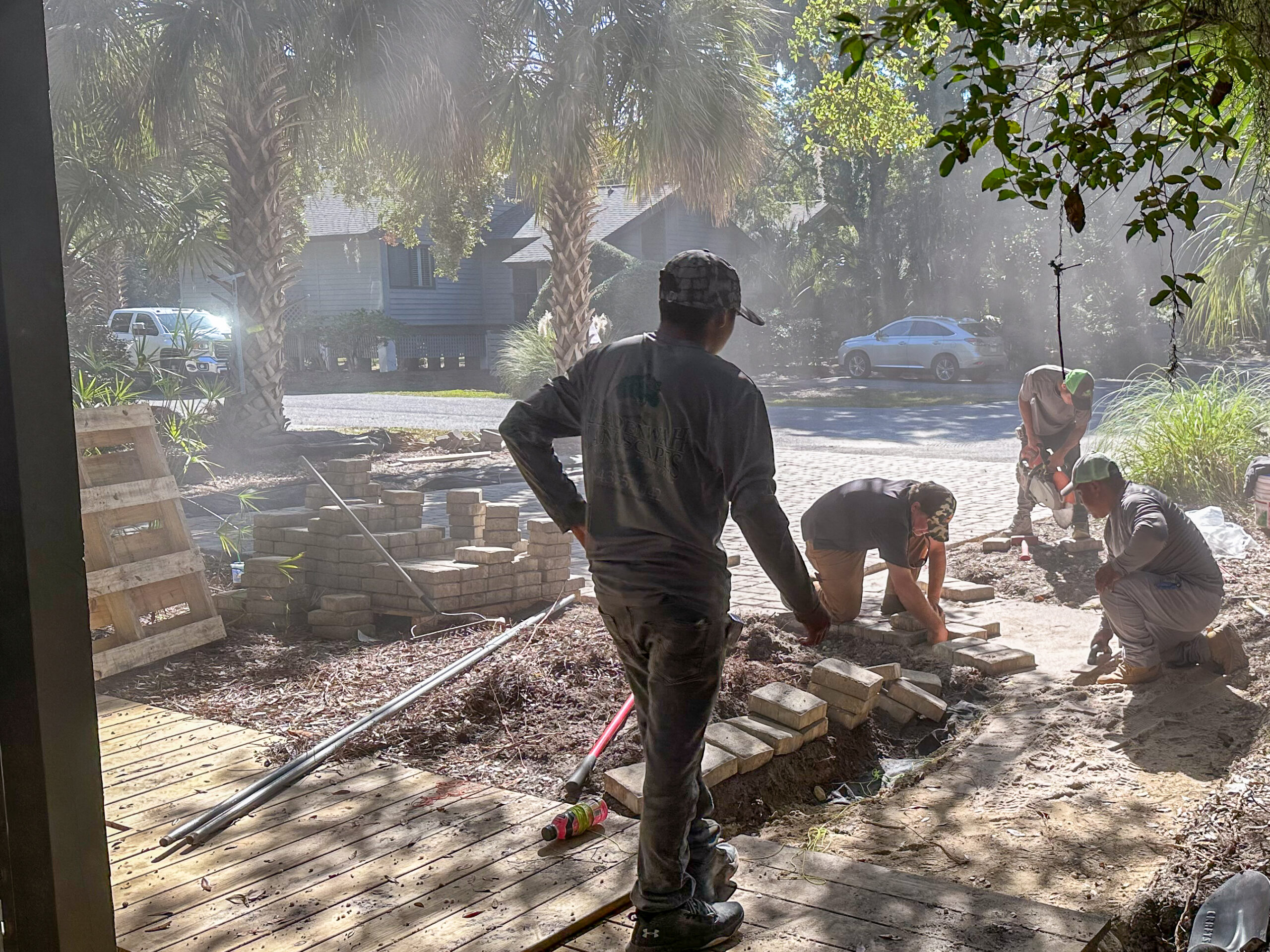
While Gene didn’t start the project with water benefits in mind, it’s an obvious choice in retrospect. He’s able to see the benefits of his work each time he steps out of his cottage. The neighborhood project means over 22,000 square feet of asphalt driveway was replaced with a permeable (allows water to drain in between) surface, close to half an acre (or about 4.5 basketball courts) of surface area. This big change supports the mission of the town’s Pervious Surfaces subgroup of the Marsh Management Workgroup. “We all know drainage is critical on an island,” remarked resident and workgroup member Diana Mezzanotte, “but homeowners might not realize how much they can do to improve drainage, simply by choosing a permeable or pervious surface.”
Permeable surfaces don’t only improve drainage; they also help improve water quality in Kiawah’s surrounding marshes, rivers and ocean. When runoff moves directly from a roadway into KICA’s drainage system, it introduces pollutants it picks up along the way. Many of those pollutants are filtered out as the water moves through the island’s interconnected pond system, but when runoff is absorbed directly into the ground, it not only picks up fewer pollutants on its shorter journey, but it benefits from the enhanced filtration action of our soil. By the time the water makes it into the water table, or the waters around Kiawah, it’s cleaner than it would have otherwise been.
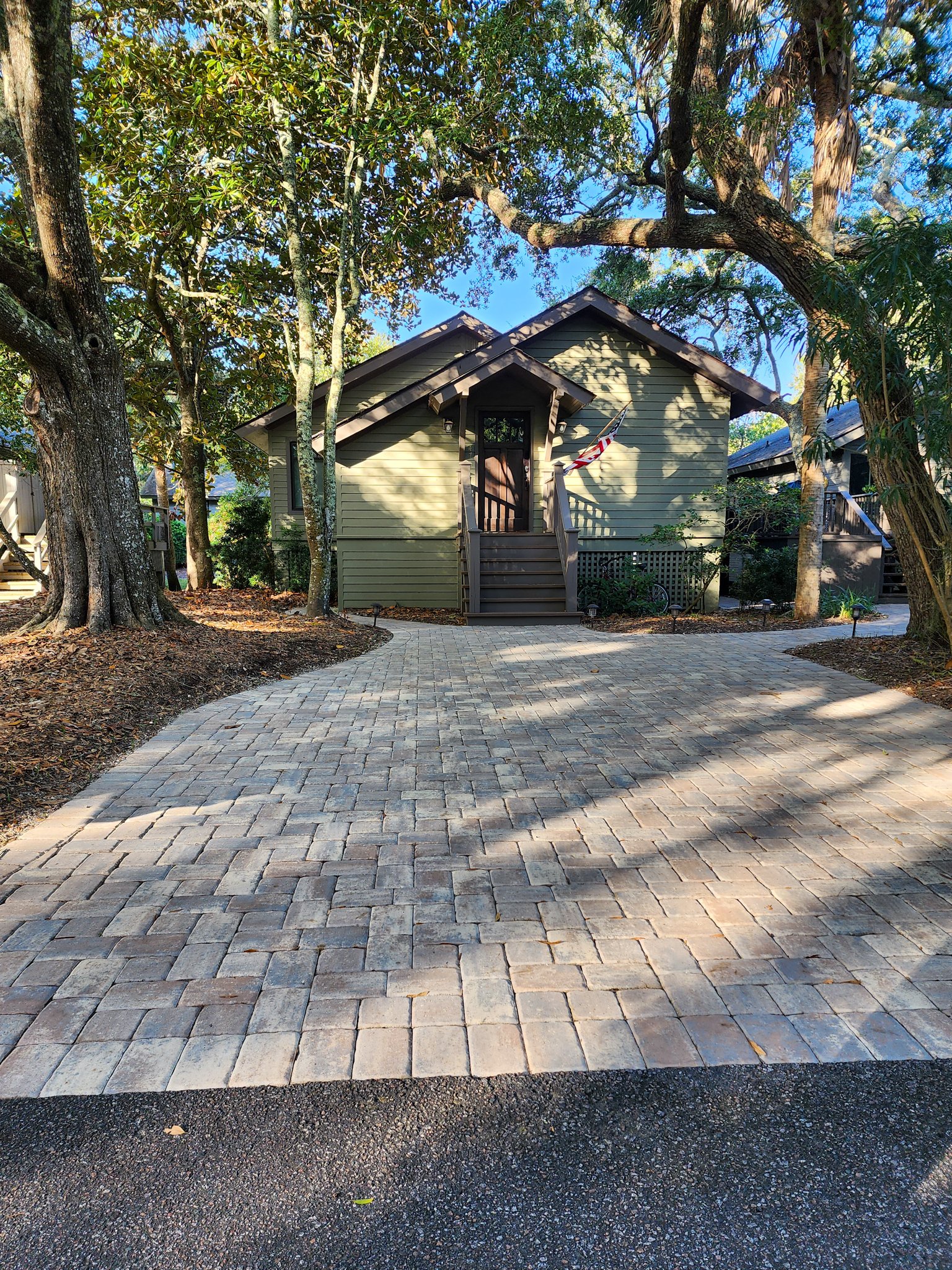
“Our community has demonstrated a commitment to water management and resilience efforts,” Diana noted. “The town has created beach and marsh management plans, as well as a sea-level rise plan. The community association has made infrastructure improvements to optimize drainage. The conservancy is studying the marsh and groundwater to make sure we have data to support future resilience efforts. Now property owners can play a part by adopting permeable or pervious driveways, walkways, or patios. They’ll see benefits to the drainage on their property, but their actions will also benefit the community as a whole.”
Some property owners in Oceanwoods went further with their resilience efforts, including one who installed a rain garden that separates the driveway’s two Cobble Blend spaces. “They dug down four feet, installed a French drain and put in native plants.” Gene noted that native plants are another feature the neighborhood is promoting through its HOA.
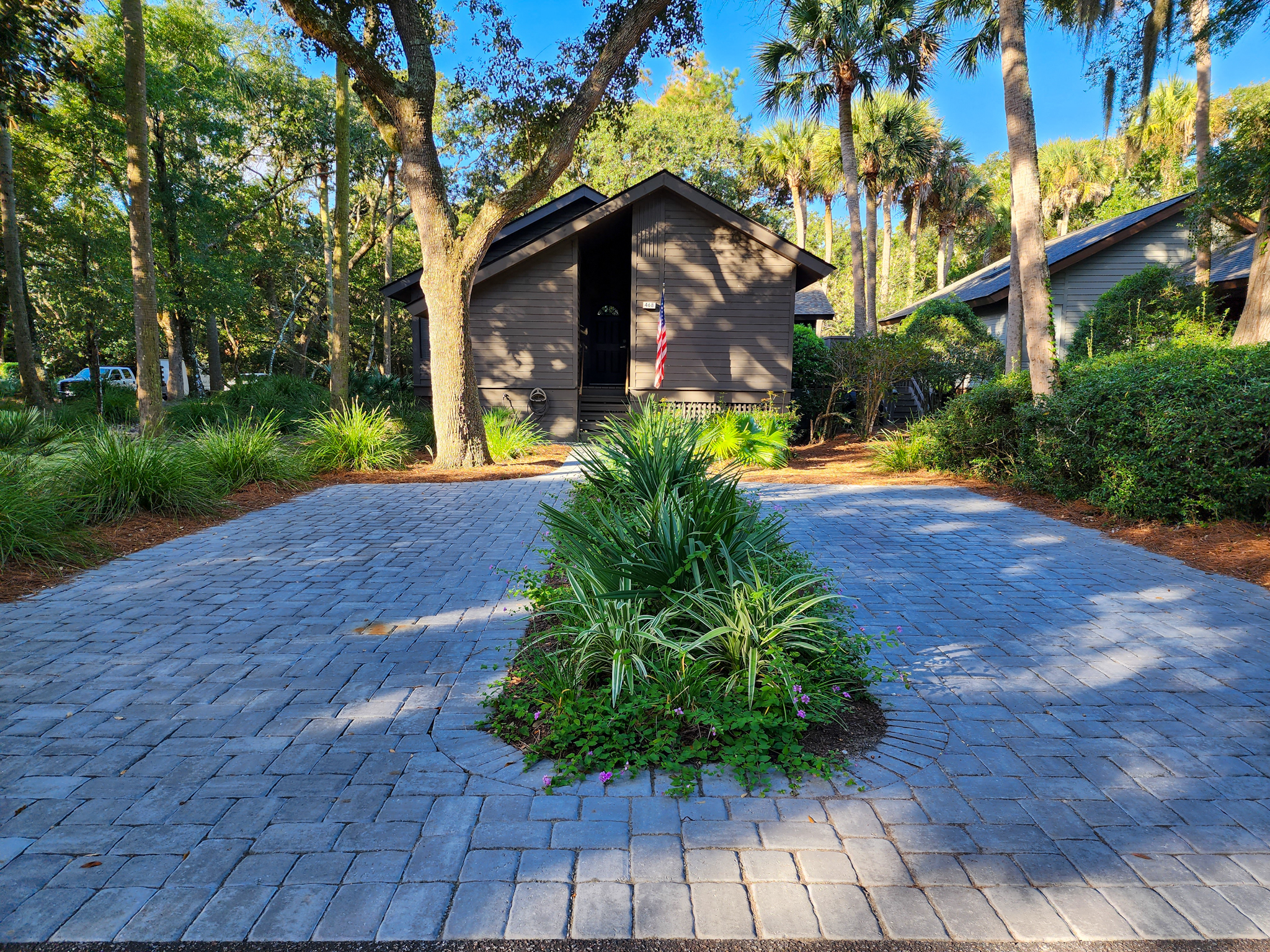
Diana hopes all Kiawah homeowners will consider adopting a permeable or pervious surface on their property. “The Marsh Management Workgroup encourages all Kiawah homeowners who are building or considering a driveway, walkway or patio replacement to choose a permeable surface, like the Oceanwoods neighborhood.” In the coming months, the town’s workgroup will share official recommendations that encourage community stakeholders to take the same approach as the Oceanwoods neighborhood.
Oceanwoods has taken several other environmentally responsible steps. Legacy street lighting was replaced with Dark Sky Lighting, ambient outdoor lights that minimize light pollution. Again they found cost savings by leasing the lighting from Berkeley rather than buying it. Gene says that the savings from the lighting will fund a new multi-year investment in converting adopted KICA easements and common areas to native plants. “We’re repurposing money that was wasted on inefficient streetlights into re-establishing green corridors for wildlife.”
By uniting as a group, Oceanwoods maximized their negotiating power and made impactful improvements to the environment and the aesthetic of the neighborhood, which also benefit the regime’s property values.
